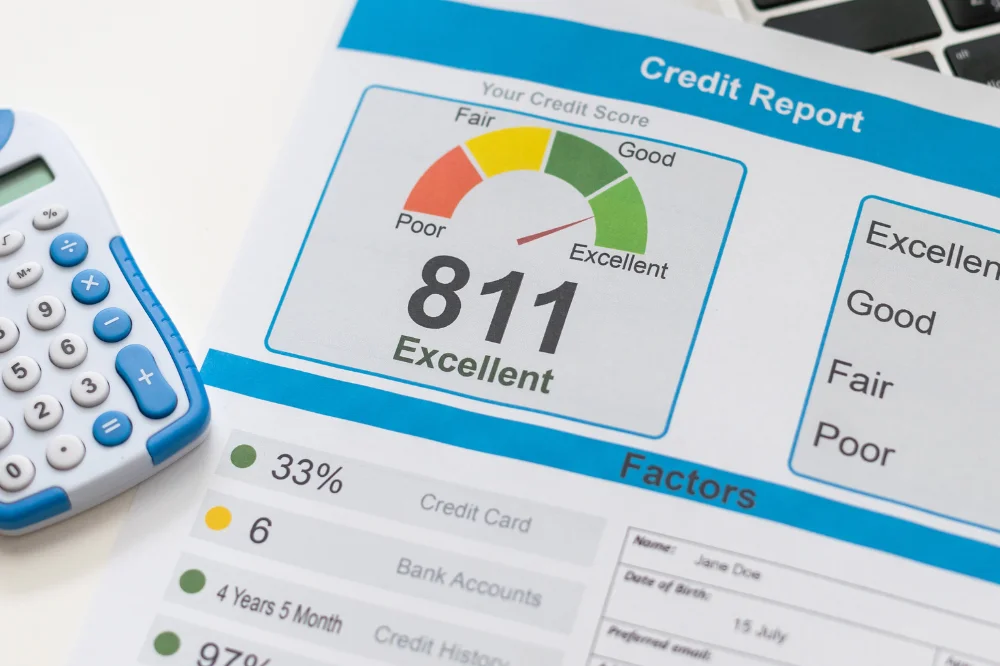When you apply for a mortgage, one of the most critical factors lenders evaluate is your credit score. It’s a number that carries significant weight, often determining not only if you’ll get approved for a loan but also what kind of terms you’ll receive. Understanding the impact of your credit score on your mortgage application can make a world of difference in your home-buying journey.
In this article, we’ll explore how your credit score affects your mortgage application, the steps you can take to improve it, and why it’s essential for securing favorable loan terms.
What is a Credit Score?
Your credit score is a three-digit number that represents your creditworthiness, based on your financial history. This number gives lenders a snapshot of how responsible you are with credit, and it’s primarily used to assess the likelihood that you’ll repay borrowed money.
How Credit Scores Are Calculated
Credit scores are calculated using factors like your payment history, the amount of debt you owe, the length of your credit history, new credit inquiries, and the types of credit you use. Each of these components contributes differently to your overall score, with payment history and amounts owed being the most significant factors.
Why Credit Scores Matter in Mortgage Applications
Credit scores are crucial in the mortgage approval process, reflecting your creditworthiness and influencing loan terms, including interest rates and amounts. Lenders typically seek a score of at least 620, with higher scores leading to better rates and potential savings over the loan’s life.
- Role of Credit Scores in Mortgage Approvals: A credit score ranges from 300 to 850. A higher score indicates responsible credit management, making you a more attractive borrower. Low scores can result in higher interest rates or even denial of your application.
- How Lenders Assess Risk: Lenders evaluate risk by analyzing credit scores alongside income, employment history, and debt-to-income ratios. High scores signify lower risk, while low scores raise concerns, prompting lenders to impose stricter terms or deny the application. Understanding this can help you improve your credit score before applying for a mortgage.
Credit Score Ranges and Their Meaning
Range-1: Excellent Credit Scores
Scores above 750 are considered excellent. Borrowers with excellent credit scores are often offered the lowest interest rates and the best loan terms.
Range-2: Good, Fair, and Poor Credit Scores
- Good: Scores between 700 and 749 are considered good, and you’re likely to receive competitive mortgage rates.
- Fair: Scores from 650 to 699 fall into the fair category. While you can still get approved for a mortgage, you may not receive the best rates.
- Poor: Scores below 650 are considered poor, and you might struggle to find a lender willing to approve your application without additional conditions.
How Your Credit Score Affects Mortgage Rates
Your credit score plays a vital role in determining the interest rate on your mortgage. Lenders use this score to gauge your risk as a borrower, impacting the overall cost of your loan.
- High Credit Scores and Lower Interest Rates: Borrowers with high credit scores (typically above 740) often qualify for lower interest rates. A strong score indicates responsible credit behavior, leading lenders to view these borrowers as low-risk. This can result in significant savings over the life of the loan.
- Low Credit Scores and Higher Interest Rates: Conversely, borrowers with low credit scores (below 620) may face higher interest rates or even difficulty securing a mortgage. Lenders perceive these individuals as higher-risk, which results in increased costs to offset potential losses. Improving your credit score can help you secure more favorable mortgage rates.
Credit Score Requirements for Different Mortgage Types in Canada
In Canada, various mortgage types come with distinct credit score requirements. Understanding these can help you choose the right mortgage and improve your chances of approval.
1. Conventional Mortgages
Conventional mortgages typically require a credit score of at least 620. These loans are not insured by the government, so lenders look for borrowers with strong credit histories. A higher score (above 740) can lead to better interest rates.
2. High-Ratio Mortgages
For high-ratio mortgages, where the down payment is less than 20%, the minimum credit score requirement is generally around 600. These loans must be insured by a mortgage insurance provider, which can be more lenient with credit scores compared to traditional lenders.
3. Government-Backed Mortgages
Government-backed mortgages, such as those offered through the Canada Mortgage and Housing Corporation (CMHC), usually require a minimum credit score of 580. These loans are designed to help first-time homebuyers and those with lower credit scores access financing.
4. Private Mortgages
Private mortgages often have more flexible credit score requirements, sometimes accepting scores as low as 500. However, these loans typically come with higher interest rates and fees due to the increased risk associated with lower credit scores.
How to Check Your Credit Score in Canada
Monitoring your credit score is essential for maintaining good financial health, especially when applying for a mortgage. Here’s how you can check your credit score in Canada.
Where to Check Your Credit Score for Free
You can check your credit score for free through several platforms in Canada, including:
- Equifax and TransUnion: Equifax and TransUnion are the two main credit bureaus in Canada. Both offer free access to your credit report once a year, and you can obtain your score through their websites or by requesting it via mail.
- Credit Karma: Credit Karma is an online platform that provides free access to your credit score and regular updates. It also offers insights into how your credit score changes over time.
- Borrowell: Another popular option, Borrowell gives you free access to your credit score and personalized recommendations for improving it.
How Often You Should Check It
It’s advisable to check your credit score at least once a year to stay informed about your credit health. However, if you are planning to apply for a mortgage or make significant financial decisions, consider checking your score more frequently—every few months is ideal. Regular monitoring helps you catch any inaccuracies or fraudulent activity early.
Factors That Can Damage Your Credit Score
- Missed Payments: Missing payments on loans or credit cards is one of the quickest ways to lower your credit score. Even a single missed payment can have a significant impact.
- High Credit Card Balances: Carrying high balances on your credit cards relative to your credit limit can also hurt your score. It’s best to keep your credit utilization below 30%.
- Opening Too Many Accounts at Once: Each time you apply for new credit, it results in a hard inquiry, which can lower your score temporarily. Opening multiple accounts in a short time can raise red flags for lenders.
Improving Your Credit Score Before Applying for a Mortgage
- Paying Down Debt: One of the most effective ways to improve your score is by paying down outstanding debt, especially credit card balances.
- Avoiding New Credit Inquiries: Avoid applying for new credit in the months leading up to your mortgage application. This will help you maintain your current score and avoid unnecessary hard inquiries.
- Correcting Credit Report Errors; Review your credit report for any errors, such as accounts that aren’t yours or incorrect payment histories. Dispute these errors with the credit bureaus to have them removed.
How Long Does It Take to Improve Your Credit Score?
Improving your credit score is a process that can vary in duration based on the methods you choose. Understanding the difference between quick fixes and long-term strategies can help you make informed decisions.
- Quick Fixes
- Paying Down Debt: Reducing your credit card balances can quickly improve your credit utilization ratio, which is a significant factor in your score. This can lead to noticeable changes within a month.
- Correcting Errors: Disputing inaccuracies on your credit report can lead to immediate improvements. Once resolved, you might see a score increase within a few weeks.
- Becoming an Authorized User: Having a strong credit user add you as an authorized user on their account can boost your score almost instantly, depending on their credit utilization and payment history.
- Long-Term Strategies
- Consistent On-Time Payments: Establishing a habit of making timely payments on all debts will improve your score over time. Significant improvements can be seen after several months of consistent payment history.
- Building a Diverse Credit Mix: Over time, having a variety of credit types (like installment loans and credit cards) can enhance your credit profile, leading to a better score in the long run.
- Length of Credit History: As your credit accounts age, your score may improve. This is a gradual process and may take several years.
While quick fixes can provide immediate results, implementing long-term strategies is crucial for sustainable credit score improvement. For personalized guidance tailored to your mortgage goals, consult with a mortgage specialist.
The Impact of a Low Credit Score on Your Mortgage Application
A low credit score can significantly hinder your chances of securing a mortgage. Understanding these impacts is essential for potential homebuyers.
- Denial of Applications
One of the most severe consequences of a low credit score is the potential denial of your mortgage application. Lenders use credit scores as a primary indicator of risk. If your score falls below their minimum requirements—usually around 620—lenders may reject your application outright. This can be particularly discouraging for first-time homebuyers who are eager to enter the market.
- Less Favorable Loan Terms
If you do manage to secure a mortgage with a low credit score, be prepared for less favorable loan terms. Lenders may impose higher interest rates and require larger down payments to offset their perceived risk. This not only increases your monthly payments but can also lead to paying significantly more over the life of the loan. Improving your credit score before applying for a mortgage can help you secure better terms and ultimately save money.
Can You Get a Mortgage With Bad Credit?
While having bad credit can complicate the mortgage application process, it is still possible to secure a mortgage. Here are some options for applicants with poor credit and how larger down payments can make a difference.
Options for Applicants With Bad Credit
- Government-Backed Loans: Programs like the Canada Mortgage and Housing Corporation (CMHC) offer loans designed for individuals with lower credit scores. These loans often have more lenient requirements, making them accessible for those with bad credit.
- Subprime Lenders: Some lenders specialize in offering loans to borrowers with poor credit. However, these loans typically come with higher interest rates and fees, so it’s essential to carefully evaluate the terms before proceeding.
- Private Mortgages: Individuals or organizations that offer private mortgages can be an option for those with bad credit. These lenders may have less stringent criteria, but they often charge higher rates and require a thorough assessment of your financial situation.
How Larger Down Payments Can Help
Making a larger down payment can significantly improve your chances of getting approved for a mortgage with bad credit. A substantial down payment reduces the lender’s risk, as it lowers the loan-to-value (LTV) ratio. This may lead to:
- Increased Approval Odds: Lenders may be more willing to overlook a low credit score if you provide a larger down payment.
- Better Loan Terms: A higher down payment can lead to more favorable loan terms, such as lower interest rates, which can save you money over time.
In summary, while bad credit poses challenges, exploring various options and considering a larger down payment can enhance your chances of mortgage approval.
How to Rebuild Your Credit After Mortgage Denial
Facing mortgage denial can be disheartening, but it also presents an opportunity to take proactive steps to rebuild your credit. Here’s how to move forward effectively.
Steps to Rebuild Credit After Rejection
- Review Your Credit Report: Obtain your credit report from major credit bureaus and check for errors. Dispute any inaccuracies, as they can negatively impact your score.
- Pay Down Existing Debt: Focus on reducing outstanding debts, especially high-interest credit card balances. Lowering your credit utilization ratio can lead to a quicker score improvement.
- Make Timely Payments: Ensure that you pay all bills on time, including credit cards, loans, and utilities. Consistent, on-time payments will positively influence your credit score over time.
- Establish a Credit Mix: Consider diversifying your credit by adding different types of accounts, such as an installment loan or secured credit card. This can help improve your credit profile.
- Limit New Applications: Avoid applying for multiple new credit accounts within a short period, as this can further impact your credit score. Focus on stabilizing your current credit situation first.
Alternative Financing Options
- Subprime Mortgages: These loans are designed for borrowers with poor credit. While they may come with higher interest rates, they can provide an avenue to homeownership.
- Private Lenders: Some private lenders may offer loans to individuals with lower credit scores. Be cautious, as these loans often come with higher interest rates.
- Rent-to-Own Programs: Consider rent-to-own agreements, which allow you to rent a home with the option to buy later. This can help you improve your credit while working toward homeownership.
Conclusion
Your credit score plays a crucial role in your mortgage application process. A higher score can save you thousands over the life of your loan by securing lower interest rates and better terms. On the other hand, a low score can make it difficult to get approved or result in higher costs. By understanding how credit scores work and taking steps to improve yours, you can increase your chances of getting the best possible deal on your mortgage.
FAQs
- What credit score is needed for a mortgage?
- Most conventional loans require at least a 620 credit score, but FHA loans may allow lower scores.
- Can I get a mortgage with bad credit?
- Yes, but you may face higher interest rates and limited loan options. Consider FHA loans if you have bad credit.
- How does my credit score affect my mortgage rate?
- A higher credit score can result in a lower interest rate, saving you money over the life of the loan.
- How can I improve my credit score quickly?
- Paying down credit card balances and disputing errors on your credit report can provide quick improvements.
- Will checking my credit score hurt it?
- No, checking your own credit score is considered a soft inquiry and won’t affect your score.





